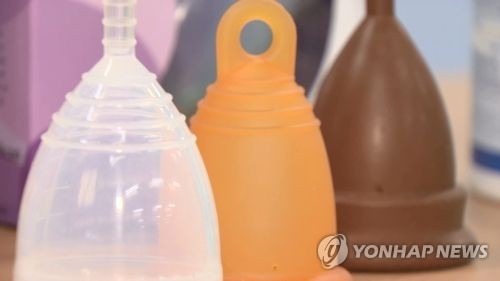Toxin safety check to be conducted on menstrual cups
By Ock Hyun-juPublished : Aug. 29, 2017 - 18:28
The government said Tuesday it will carry out safety checks on menstrual cups before approving them for sale, amid growing concerns over the safety of feminine hygiene products here.
The Ministry of Food and Drug Safety is looking into levels of volatile organic compounds, including a variety of chemicals that may cause health problems, potentially contained in the menstrual cups by an American brand.
“We decided to inspect whether VOCs are contained in menstrual cups, what kinds of VOCs and whether they are harmful to human health, given heightened anxiety over the safety of menstrual products,” an official from the ministry said.
The Ministry of Food and Drug Safety is looking into levels of volatile organic compounds, including a variety of chemicals that may cause health problems, potentially contained in the menstrual cups by an American brand.
“We decided to inspect whether VOCs are contained in menstrual cups, what kinds of VOCs and whether they are harmful to human health, given heightened anxiety over the safety of menstrual products,” an official from the ministry said.

VOCs are at the center of safety concerns, as a growing number of women have reported symptoms such as fluctuations in menstrual cycle and volume after using Lilian brand sanitary pads. The pads were revealed to contain the highest concentration of VOCs among those in a recent study of 10 sanitary pads sold here.
In safety test results of 10 disposable sanitary napkins and panty liners released in March by the Korean Women’s Environmental Network, all the products contained more than 200 different VOCs, including cancer-causing benzene. Tampons were not tested.
“After reviewing the inspection results and what harmful impacts VOCs have on human health, we will decide whether to approve the menstrual cups for sale,” the official said.
The inspection on the menstrual cup brand will last for about a month. Its safety was already approved by the US Food and Drug Administration, according to the ministry.
The Drug Ministry, already under fire for its belated response to the crisis, is running safety inspections on all sanitary pads sold here to determine the levels of VOCs in the products and their impact on human bodies. The report is to be released by the end of September.
There are currently no regulations on potentially harmful VOCs in either Korea or abroad.
Many women here, however, have already turned to alternatives such as menstrual cups and reusable cotton pads amid fears over possibly toxin-ridden sanitary pads.
According to a survey by the Drug Ministry released in May, some 81 percent of women in Korea use sanitary pads, with only 11 percent using tampons. While just 1.4 percent used menstrual cups, 41 percent were aware of them.
Malltail, which provides delivery services for Korean consumers shopping directly from overseas sellers, says sales of menstrual cups on its affiliate site Vitatra soared 470 percent during the week of Aug. 18-24, compared to the previous week.
(laeticia.ock@heraldcorp.com)
-
Articles by Ock Hyun-ju









![[Hello India] Hyundai Motor vows to boost 'clean mobility' in India](http://res.heraldm.com/phpwas/restmb_idxmake.php?idx=644&simg=/content/image/2024/04/25/20240425050672_0.jpg&u=)









